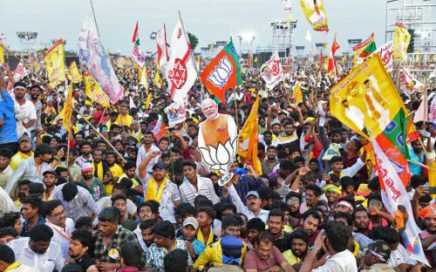Nagpur/New Delhi: In a recent interview with an English TV news channel, Union Minister Nitin Gadkari voiced his support for the Electoral Bond Scheme, expressing concerns that its scrapping could potentially open the doors for the influx of black money into the Indian political landscape.
Gadkari’s remarks come in the wake of the Supreme Court’s decision earlier this month to scrap the scheme, citing concerns over undisclosed and unlimited corporate donations influencing political decisions.
Gadkari, while acknowledging the necessity of funds for election campaigns, defended the Electoral Bond Scheme as a means to provide financial support to political parties while also stimulating economic growth. He emphasized that the scheme was conceptualized during the tenure of the late Arun Jaitley, former Finance Minister, with the intention of bolstering the economy and supporting Prime Minister Narendra Modi’s vision for economic advancement.
The Union Minister refuted claims of impropriety associated with the Electoral Bond Scheme, arguing against its characterization as a conduit for quid pro quo arrangements between political donors and recipients. He dismissed concerns regarding the potential injection of black money into the political process through electoral bonds, asserting that such funds contribute to economic growth, job creation, and revenue generation within the country.
Earlier this month, the Supreme Court had scrapped the Electoral Bond Scheme, objecting to the unlimited and undisclosed funding through corporate donations that come with strings attached.
“Political contributors get access… this access leads to policy making… because of the nexus between money and voting. Financial support to political parties can lead to quid pro quo arrangement,” Chief Justice of India Chandrachud had said.
Despite the Supreme Court’s verdict and mounting scrutiny, Gadkari refrained from directly commenting on the judicial decision, but cautioned against the unintended consequences of banning electoral bonds. He warned that prohibiting electoral bonds could drive political funding underground, leading to the proliferation of black money in the electoral process.
“If you do not allow electoral bonds, people will take money as number two. This will happen anyway,” he said.
Gadkari pointed out that electoral bonds “will be purchased by people who are wealthy. Those wealthy would be contractors. Or have made it big in trade or industry. So it is not right to link it to that (quid pro quo),” he said.
When it was pointed out that electoral bonds can bring black money into the system, Gadkari said, “How can money that create growth, and generate employment and revenue be called black money? The problem is money that is taken outside the country and dumped elsewhere”.
The top court had called the Electoral Bonds Scheme unconstitutional, saying information about funding of political parties is essential to make electoral choices since the system leads to tweaking of the country’s policies in favour of the donor. While the Indian election system involves secret ballot, the cloak of anonymity cannot be extended to political donations above the Rs 2000 threshold, the court had said.
Gadkari’s steadfast defence of the Electoral Bond Scheme underscores the contentious debate surrounding political finance reform in India. While proponents argue for its potential to streamline campaign financing and stimulate economic growth, critics contend that the lack of transparency and accountability poses a significant threat to the integrity of democratic institutions. As the discourse on electoral funding continues, policymakers face the challenge of striking a balance between promoting financial transparency and ensuring the robustness of democratic processes.















